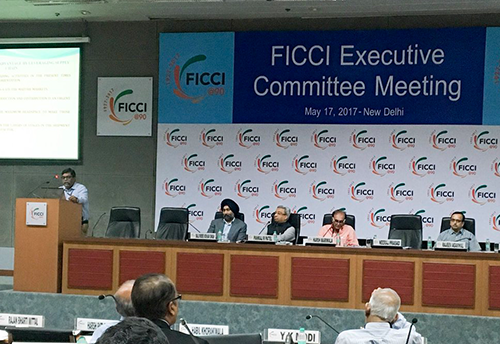MEIS being re-designed to make exports GST-compliant: CBEC
Updated: May 17, 2017 10:28:11am

MEIS being re-designed to make exports GST-compliant: CBEC
New Delhi, May 17 (KNN) The Merchandise Exports from India Scheme (MEIS) is being re-designed to make exports from India GST-compliant and the issue of working capital requirements under the new tax regime is being deliberated upon by the government, said Neeraj Prasad, Additional Commissioner, GST Cell, Central Board of Excise and Customs (CBEC).
He said that the GST regime would help build competitive advantage by leveraging supply chain.
Prasad was addressing FICCI’s Executive Committee Meeting here today.
While manufacturing and trading activities at present times have a strong taxation orientation and the cost of logistics is high vis-a-vis the mature markets, adoption of GST will reduce the cost of production and distribution.
It will also pave the way for the transfer of consignments directly from plant to the wholesaler and retailer, thereby eliminating the inventory cost in many supply chain operations, he added.
According to a press release, Prasad said that technology in logistics, such as the use of advanced telematics, real-time vehicle tracking and route planning are likely to help manage and execute operations in a efficient and seamless manner and added that implementation of GST will finally set the ball rolling for the emergence of the hub and spoke model in the Indian transportation sector.
He said that job work under GST would encourage lean manufacturing even as the switchover to GST for the largely unorganized logistics sector would be challenging as the interplay of technology will intensify. GST, he said, would lead to re-alignment in the main verticals of supply chain and would bring down the dominating unorganised factor in the logistics business.
As regards the implications for State finances Prasad said that the RBI in its latest report on state finances mentions that the introduction of the GST is likely to have an enduring impact on state finances as GST would lead to revenue expansion which would also possibly result in augmenting the shareable pool leading to greater transfer of resources from the Centre to the states.
Furthermore, the Federal Reserve of USA, in a recent research paper states that the welfare enhancement through GST has the potential to expand the GDP by 3-4 percentage points, the release added.
Rajeev Agarwal, Senior Vice President (Outreach & Cpacity Building), Goods and Services Tax Network (GSTN), made a presentation on GST IT strategy. The mandate of GSTN, he said was to build the GST IT System to provide shared IT infrastructure and services to Central and State Governments, tax-payers and other stakeholders for implementation of GST; develop Common Registration, Return Filing and e-Payment services running on a Common GST Portal; integrate Common GST Portal with existing tax administration systems of Centre and States and build efficient and convenient interfaces for tax payers.
Sharing the GST Status Update, Harsh Mariwala, Chairman FICCI’s Task Force on GST & Chairman, Marico Ltd, said the Finance Minister was treating rates on a mechanical basis, which was a positive sign for industry as it meant current excise and VAT rates were being considered for fixing the tax slabs in GST.
The GST Council’s meeting, which is scheduled for the next two days, would primarily discuss the tax rates and exemptions under GST. He added that there would be disruptions in the implementation phase of GST and industry should prepare for it.












